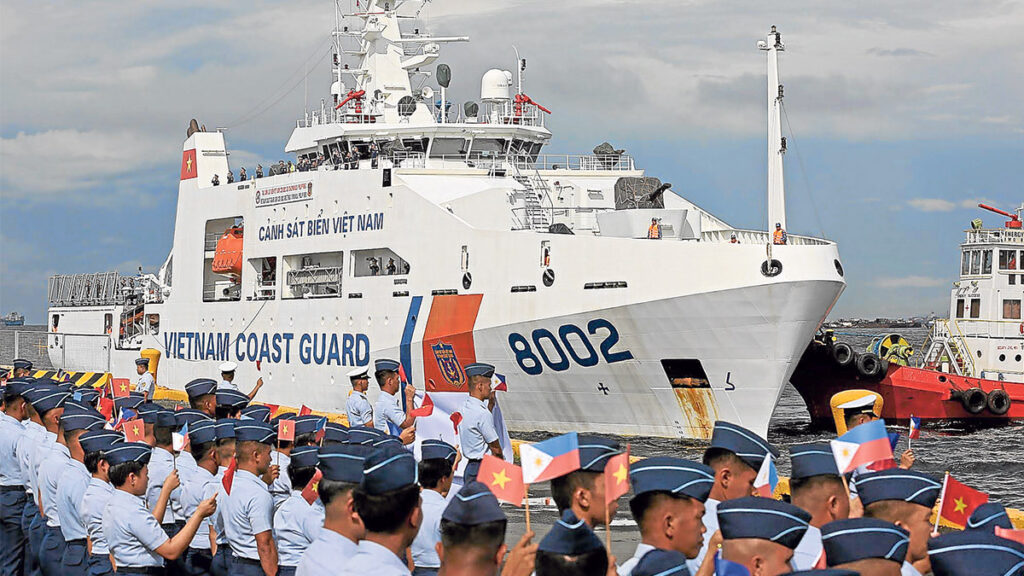
PORT CALL Members of the Philippine Coast Guard on Monday welcome Vietnam Coast Guard CSB 8002 and its crew at South Harbor in Manila for a five-day port call. The coast guards of the two countries will hold joint exercises for search and rescue, and fire and explosion prevention training. —Richard A. Reyes
MANILA, Philippines — Vietnamese coast guard assets arrived in Manila on Monday to conduct maritime security drills for the first time in what analysts deem as a “revolutionary” and “very significant” move of both countries facing common threats in the South China Sea.
Vietnam Coast Guard’s (VCG) CSB 8002, along with some 80 personnel, arrived at the Philippine Coast Guard (PCG) port on Monday and will remain in the country until Friday.
Col. Hoang Quoc Dat, vice commander of VCG Region 2, said several maritime security drills will be held during their stay in the country.
Hoang noted that VCG’s unprecedented deployment of its 2.4 ton ship is due to the memorandum of understanding (MOU) that Manila and Hanoi signed in January which sought to enhance coordination regarding maritime issues bilaterally.
READ: PH signs MOU with Vietnam on incident prevention in South China Sea
“This will promote and enhance the efficiency of information sharing and the coordination in maritime law enforcement in accordance with international law, thereby contributing to the preservation and protection of the region’s maritime security and safety,” Hoang said in his speech.
Communication hotlines
PCG spokesperson Rear Admiral Armand Balilo said he hopes that this engagement will lead to the establishment of communication hotlines between Manila and Hanoi for faster coordination.
Balilo also floated the possibility that the PCG will send its assets to Vietnam for similar engagements.
“That is one of the things we are looking at, to reciprocate this kind of activity,” Balilo said in an ambush interview, partly in Filipino.
Analysts welcomed this development between Manila and Hanoi despite their overlapping claims in the South China Sea, parts of which it refers to as the West Philippine Sea and East Sea, respectively.
Beijing asserts sovereignty in the entire South China Sea, but an international tribunal, after a case filed by Manila in 2013, effectively dismissed such claims.
Manila bore the brunt of Beijing’s aggressions, the latest of which was at Ayungin (Second Thomas) Shoal which saw last June 17 the most violent actions of China Coast Guard (CCG) so far, leading to the finger amputation of one of the Philippine Navy personnel.
Hanoi also saw previous water cannon assault by CCG in previous years, but it asserts its claims through aggressive island reclamations in its occupied features.
Geopolitical expert Don McLain Gill said the VCG deployment is “very significant”, indicating a policy shift of Hanoi in dealing with Beijing’s “belligerence.”
Confidence building
“This is a step closer to more enhanced confidence building,” Gill told INQUIRER.net over the phone on Monday.
Gill noted that “because of the pressures China has been putting upon Vietnam … it realizes that it needs to work with more countries.”
“If Vietnam and the Philippines are able to strengthen their confidence building with one another, enhance mutual trust it would be harder for China to create a wedge,” Gill, lecturer at the De La Salle University’s Department of International Studies, further said. “China goes by a divide and conquer sort of a position in the South China Sea.”
Security expert Chester Cabalza also said this move is crucial to further promote Asean centrality when it comes to the South China Sea dispute.
Cabalza, in a message to INQUIRER.net on Monday, said this move is “a revolutionary coast guard diplomacy that could set bigger steps for the role of white ships in maintaining maritime law and order in the region.”
“The coast guard cooperation will standardize greater Asean centrality encompassing power competition in the region,” Cabalza, president and founder of Manila-based think tank International Development and Security Cooperation, also said.
“As the two emergent dynamic middle power economies of Southeast Asia, the joint maritime exercise shows the maturity of the strategic partners in spite of differing political systems that build harmony and combined efforts that Asean can be united rather than divided on maritime security,” he continued.
For comprehensive coverage, in-depth analysis, and the latest updates on the West Philippine Sea issue, visit our special site here. Stay informed with articles, videos, and expert opinions.
